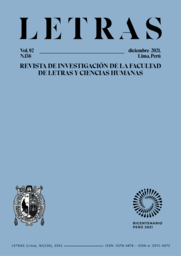Exile as Political Concept in Juan Pablo Viscardo y Guzman’s Letter to the Spanish american people
Abstract
Exile is, in Viscardo Guzmán’s works, not only a biographical fact but an important concept to understand Spanish American history and colonial condition. In his Letter, Viscardo y Guzmán gives some historical examples of the King’s cruelty towards his colonial subjects, from the Andean nobles exiled after the rebellion of Tupac Amaru I, the last Inca from Vilcabamba, to the recent expulsion of his Jesuits brothers. He arrives at the conclusion that the Spanish Crown has only mistreated and unjustly punished the Spanish Americans in these two hundred years of colonial history. Viscardo y Guzmán’s discourse shows that Spanish American’s rights are not recognized by the Spanish crown and Spanish Americans live under the rule of a permanent state of exception. Exile is one of the most visible signs of the tyranny that Spanish Americans are subjected to during the two centuries of colonial history. In this text I study the relation between the figure of the sovereign and the state of exception in Viscardo y Guzmán’s Letter and exile as one of the main conditions of colonial subjects, an exile not only in geographical but also historical terms. According to Viscardo y Guzmán, Americans are exiled from their own history. To understand the notion of sovereignty and state of exception I take into account classical authors such as Jean Bodin and Hobbes as well as contemporanean ones such as Carl Schmitt, Giorgio Agamben, and Walter Mignolo.Downloads
Métricas alternativas
References
Agamben, G. (1996). Política del exilio. Archipiélago, Cuadernos de Crítica de la Cultura, 26-27, 41-61.
Agamben, G. (1998). Homo sacer. Sovereign Power and Bare Life. Stanford University Press.
Agamben, G. (2005). State of exception. The University of Chicago Press.
Batllori, Miguel, S. J. (1966). La cultura hispano-italiana de los jesuitas expulsos: españoles, hispanoamericanos, filipinos: 1767-1814. Gredos.
Bodin, J. (1973). Los seis libros de la República. Madrid: Editorial Aguilar.
Brading, D. (2011). Profecía y Patria en la Historia del Perú. Fondo Editorial del Congreso del Perú.
Bravo, G. (2007). Las consecuencias económicas de la expulsión de los jesuitas de las provincias de Chile y Perú. En M. Marzal y L. Bacigalupo, Los Jesuitas y la modernidad en Iberoamérica (421-445). Instituto Francés de Estudios Andinos.
Caro, F. y Saldivia, Z. (2013). Francisco Suárez y el impacto de su teoría sobre la potestad divina y monarquía en América. Cuadernos del Pensamiento Latinoamericano, 18, 1-14. https://bit.ly/3mcFPPC
Clavijero, F. (2003 [1780]). Historia Antigua de México (10.ª ed.). Porrúa.
De Oto, A. y Quintana, M. (2010). Biopolítica y colonialidad. Una lectura crítica de Homo Sacer. Tabula Rasa, 12, 47-72. https://doi.org/10.25058/20112742.384.
Hobbes, T. (2005). Leviatán. Fondo de Cultura Económica.
Las Casas, B. de. (2006 [1552]). Brevísima relación de la destrucción de las Indias. Edición de José Miguel Martínez Torrejón. Alicante: Biblioteca Virtual Cervantes. http://www.cervantesvirtual.com/nd/ark:/59851/bmcjm259.
Lavalle, B. (1993). Las promesas ambiguas. Criollismo Colonial en los Andes. Pontificia Universidad Católica del Perú.
Macera, P. (1999). Viscardo y los criollismos coloniales. En VV. AA., Juan Pablo Viscardo y Guzmán (1748-1798). El Hombre y su tiempo II (269-272). Fondo Editorial del Congreso del Perú.
Merle, A. (2014). El De Rege de Juan de Mariana (1599) y la cuestión del tiranicidio: ¿un discurso de ruptura?. Criticón, 120-121, 89-102. https://doi.org/10.4000/criticon.779.
Mignolo, W. (2008). La opción de-colonial: Desprendimiento y apertura. Un manifiesto y un caso. Tabula Rasa, 8, 243-281. https://doi.org/10.25058/20112742.331.
Mörner, M. (1966). Los motivos de la expulsión de los jesuitas del Imperio Español. Historia Mexicana. El Colegio de México, 16(1), 1-14. https://historiamexicana.colmex.mx/index.php/RHM/article/view/1070/961.
Roniger, L. (2007). Antecedentes coloniales del exilio político y su proyección en el siglo XIX. Estudios Interdisciplinarios de América Latina y el Caribe, 18(2), 31-52. http://eial.tau.ac.il/index.php/eial/article/view/573.
Roniger, L. Sznajder, M. (2013). La política del destierro y el exilio en América Latina. Fondo de Cultura Económica.
Scarano, M. (2013). La carta a los españoles americanos, de Juan Pablo Viscardo. Aportes para el estudio del siglo XVIII hispanoamericano. América sin nombre, 18, 149-161. https://doi.org/10.14198/AMESN2013.18.13.
Schmitt, C. (2015). Political theology. University of Chicago Press.
Viscardo y Guzmán, J. P. (1988). Obra completa. Biblioteca Clásicos del Perú, Banco de Crédito del Perú.
Viscardo y Guzmán, J. P. (2004). Carta dirigida a los españoles americanos. Fondo de Cultura Económica.
Copyright (c) 2021 Letras (Lima)

This work is licensed under a Creative Commons Attribution 4.0 International License.
Este obra está bajo una licencia de Creative Commons Reconocimiento 4.0 Internacional



















